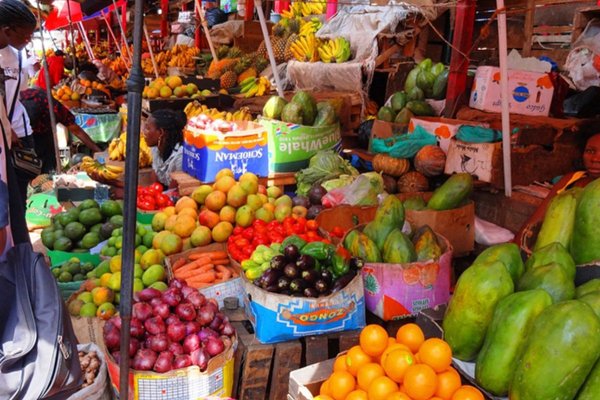Trade ministry’s Kalega Explains BUBU’s Role In Building Local Products’ Competitiveness

INTERVIEW
Although Government procurement has tremendously increased during Buy Uganda Build Uganda (BUBU) implementation, domestic consumption through ordinary channels of commerce has not been that significant.
BUBU Magazine sought out the Commissioner for Internal Trade, Mr. Zapkey Kalega (in the picture) whose docket includes BUBU, for his impression of this policy’s performance over the last five years.
You directly relate to BUBU Policy implementation, now in its fifth year; please share what you perceive to be the qualitative change the policy has impacted on production and internal trade
Before the implementation of the policy, the government was procuring a lot of its services and goods from foreign companies. This has changed tremendously with over 39 per cent government procurement of local goods and services, which has enhanced local production of cement and iron and steel construction products. The average utilization capacity previously estimated at less than 47 per cent has increased to more than 56 per cent.
Ugandan supermarkets were, before the BUBU policy implementation, typically filled with imported products, even though they could even be sourced locally; whereas the shelf space allocation for local products that stood was less than 15 per cent is now over 50 per cent. This is a very big achievement in supporting the SMEs in Agro-processing, footwear and furniture production.
Further, Ugandan products quality has improved by about 70 per cent consequent to the stringent quality requirements by government MDAs, reduction in the cost of quality certification and enforcement of compulsory standards.
A number of newly introduced locally made products like masks, salt, sanitizers, radios, television sets, tiles and automobiles and telephone devices.
While Ugandan SMEs are bracing for a foothold on the local and export markets, the government continues to invite expatriate investors to set up shop in Uganda. Please talk of the mechanisms in place for enabling the nascent manufacturer to steady and mature alongside the better-endowed newcomers
Government is aware of the advantages that foreign-sourced investors come with over local investors. However, we do not have control over the incentives regimes in such countries; the government has in place incentives to promote local investors.
Uganda Development Bank has been capitalized to the tune of Shs500 billion to facilitate the cheaper provision of development capital at a 12 per cent interest rate, below commercial banks’ lending rate of over 23 per cent. We are however aware that investment capital in many developed countries is obtained at less than a 5 five per cent interest rate.

The investment Code Act has a low threshold of US$250,000 as a requirement for local investors to qualify for incentives to manufacture in Uganda. The Reservation Scheme Guidelines under the PPDA Act provides thresholds, goods and services to be supplied to government institutions by only local manufacturers.
These include textiles, pharmaceuticals, electrical cables and conductors and supplies of less than Shs400million and non-consultancy services of less than UShs200million. Other opportunities are public works at less than UShs10billion, road works at less than UShs45billion and subcontracting of roadworks to local contractors in case of contracts of more than UShs45billion which are won by foreign contractors.
Further, there are tax incentives for local content participation in the form of tax exemptions under the Excise Act and Income Tax Act provided local content is over 70 per cent.
Ugandan supermarkets were, before the BUBU policy implementation, typically filled with imported products, even though they could even be sourced locally; whereas the shelf space allocation for local products that stood was less than 15 per cent is now over 50 per cent. This is a very big achievement in supporting the SMEs in Agro-processing, footwear and furniture production.
Further, Ugandan products quality has improved by about 70 per cent consequent to the stringent quality requirements by government MDAs, reduction in the cost of quality certification and enforcement of compulsory standards.
A number of newly introduced locally made products like masks, salt, sanitizers, radios, television sets, tiles and automobiles and telephone devices.
While Ugandan SMEs are bracing for a foothold on the local and export markets, the government continues to invite expatriate investors to set up shop in Uganda. Please talk of the mechanisms in place for enabling the nascent manufacturer to steady and mature alongside the better-endowed newcomers
Government is aware of the advantages that foreign-sourced investors come with over local investors. However, we do not have control over the incentives regimes in such countries; the government has in place incentives to promote local investors.
Uganda Development Bank has been capitalized to the tune of Shs500 billion to facilitate the cheaper provision of development capital at a 12 per cent interest rate, below commercial banks’ lending rate of over 23 per cent. We are however aware that investment capital in many developed countries is obtained at less than a 5 five per cent interest rate.

Government is in the process of establishing eighteen (18) well-facilitated industrial parks offering the entire necessary infrastructure. This supports is targeted at local investors and is expected to provide industrial spaces for manufacturers at reduced costs (land and utilities) hence cutting production expenses.
The government has replaced performance bonds with declarations to support local contractors and service suppliers to participate in public procurement. A declaration is a commitment document whereas a performance bond is money required by the procuring entity as confirmation of performance/services to be delivered.
Please share any other BUBU-related information you wish the public to know of.
The government is working around the clock to address the challenges related to delayed payments and the poor quality and standards of some products, negative mindset and capacity issues.
Domestic consumption is key to building the competitiveness of local products in terms of quality, reliability and sustainability of supply. Competitive local producers are critical to penetrating regional and international markets; indeed the international brands Ugandans are fond of were first significantly consumed back in the respective markets of their origin.
Therefore, the first step is to building a domestic market is to nurture locally-made brands. I urge all prospective consumers to prioritize purchasing local products; I appreciate those who have supported the BUBU campaign for the last five years.





